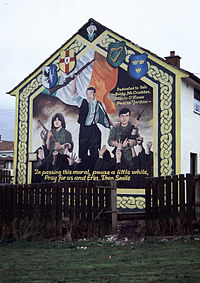| (Photo credit: Wikipedia) |
Cavanagh
sighed. ‘No. Go on ahead. What do you want to know?’
‘It’s
about your time as a prison officer in the Maze—’
The
laugh was more a bark. ‘Well, I didn’t think it was going to be about my time
as an ice cream man, now.’
Boyle
forced a smile so Cavanagh would hear it. ‘Right enough. Fair play. I’m
interested in a prisoner, name of O’Carolan. With you between seventy-eight and
eighty-nine.’
‘Swan?
I remember him right enough. Big man. Provo.’
‘That’ll
be the one.’
‘Bomber,
he was. By trade.’
‘You
called him Swan?’
‘We
did. He used to fold little origami swans. We’d clear them away from his cell
every day and give him new paper. We withdrew the privilege when he joined the
dirty protest.’
‘How
did he react to that?’
‘Nothing.
Not a thing. Never said a word about it. He was a strong man, quiet, like.’
‘Any
known associates?’
‘You
mean was he thick with anyone? They all were. They kept to themselves, right
enough. I suppose Cathal Burke, if anyone. Brian MacNamara, for the brief time
he was in. They came in together. I’d see them chat a lot on exercise, when
that was allowed. It was stopped on account of the protests.’
‘He
got full parole, didn’t he? Despite joining the dirty protest?’
‘We
recommended that after he came off the protest. He never gave us a moment’s
bother, did Swan. Always quiet, always polite. You’d not have him down as a
common criminal, a murderer, at all, except that’s just what he was, wasn’t
he?’
‘The
dirty protest was about changing that status.’
‘You
can put any label you like on murder. But he was a killer, right enough.’
‘Thank
you Mr Cavanagh.’
‘Any
time, Inspector.’
The Northern Irish peace was concluded, you could argue, in 1998 with the Good Friday Peace Agreement, but it wasn't to be until 28 July 2005 the IRA would commit to exclusively non-violent means.
There were any manner of steps towards 1998, and any number of steps after, too. I posted a few days ago about the Good Friday agreement, and Mo Mowlam's heroic role in bringing it to be. It wasn't an easy peace, by any means. Even today, the North - Northern Ireland - has its annual parades, marches and demonstrations. Each one is a potential flash point. Memories run deep and feelings can run high. People still feel and remember pain and communities remain parted along sectarian lines. There are red white and blue towns; there are green white and gold towns. But the twain would tend not to meet.
That's changing, albeit slowly. The 'peace walls' are coming down, they'll all be gone by 2023. It's still fresh ground, the shoots are fragile yet. But - and you must remember I am an incurable optimist - there is enormous hope for the future. Young people who don't remember the bitterness of the past, who can forge new friendships and romances without worrying about which community the other comes from, are increasingly common. Yet there remains a strong strain of Montague and Capulet facing young Romeos and Juliets who want to marry across communities. Even when Sarah and I were married, back in 1991, there was an awful lot of fuss about the fact we were a 'mixed marriage' - and that was in the South.
So is it too soon to open up a can of worms like A Decent Bomber? A novel about a man who was an IRA bomber in his youth - he could hardly be called decent, after all? A friend from a strong Protestant, Unionist tradition walked out on me when she found I had interviewed a former IRA man and current 'Shinner' in researching the book. Walked out leaving me stunned, I have to say.
If feelings run as high over this book as they did with Olives - A Violent Romance, I'd be concerned (Olives led to much silliness and a daft, but nevertheless momentarily disconcerting, death threat). Frankly, the financial benefits even if the book were a runaway bestseller wouldn't be worth having to worry about someone from the extreme edges taking exception to my IRA man or my Unionist copper. Let alone as a self-published marginal little effort. It kept me up at nights while I was writing the book, I have to say. I mean, did I even want to go there? And that thought, in itself, was enough to say to me, yes.
I tried to bring balance to it, to show sides to the story (an Irish saying, 'There are three sides to every story; yours, mine and the right one) and bring my conflicted characters together to face a common enemy that, if anything, brought them together. Remember the old Arab phrase, 'My brother against my cousin, my cousin against the stranger'? Oddly enough, a shared challenge can speed reconciliation.
I dearly wish the book is widely enjoyed by people from both sides of the fence, perhaps even with the odd wry smile. We can only wait and see, can't we?



No comments:
Post a Comment